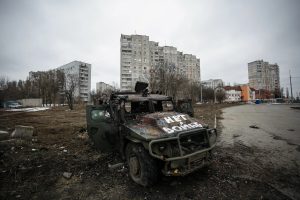Another man has been jailed in Uzbekistan for fighting in the war in Ukraine.
On November 4, a court in the Qoʻshtepa district of Fergana Region sentenced 51-year-old Alisher Khalikov to five years in prison for engaging in “mercenary activities.” Since Russia’s full-scale invasion of Ukraine began in February 2022, numerous reports have shed light on the recruitment of Central Asians in Russia into the military effort.
Following Moscow’s “partial mobilization” in late September 2022, Central Asian governments issued several warnings and reminders to their citizens that joining the war could land them in jail back home. Uzbekistan had actually warned its citizens against creating “volunteer battalions” a month earlier, in August 2022, after a video surfaced of an Uzbek migrant leader in Perm, Russia, proposing the creation of a “volunteer battalion” to join the “special military operation” in Ukraine — the euphemism Moscow prefers for the invasion and ongoing war in Ukraine.
Khalikov is at least the third Uzbek citizen to be jailed this year for joining Russia’s war effort, following 42-year-old Golib Aliyev, who was sentenced to five years in June, and a 56-year-old Samarkand resident who was give a three year prison sentence.
Their stories paint a picture of desperation and exploitation, and their fates — jail terms upon returning to Uzbekistan — underscore the country’s precarious position. The Uzbek government has shied away from directly criticizing Russia for its war in Ukraine, but it has not held back on punishing its own citizens for joining the effort. As Niginakhon Saida highlighted recently, Russian politicians and commentators have had no shortage of nasty remarks for Uzbek migrant workers, and received some pushback from Uzbek politicians in return. And yet state-level relations carry on as usual.
As reported by Kun.uz, citing his testimony in court, Khalikov admitted guilt. He explained that in May 2023 he traveled to St. Petersburg via Kyrgyzstan and worked in the Russian city as a baker and then in a warehouse. In his testimony, Khalikov said that in November 2023 he hit a manager at the warehouse, another Uzbek named Akmal, who had promised to pay the workers wages but had not. Khalikov and a friend were detained after the altercation.
At the police station, a lawyer “explained that beating Akmal was a crime and we could be imprisoned for 5 years.”
He said that if we went to work in Ukraine, we would be released from liability. Both Umid and I, in order to avoid liability, agreed to his proposal and signed two copies of the contract provided by the police. After that, we were given a certificate of dismissal and released.
Khalikov had signed a one-year contract with the Russian Ministry of Defense. Within a week, he was sent to a base near the Russian-Finnish border. A month later, he was shipped off to a military training facility in Belgorod and then onward to the front. In February 2024, Khalikov was in a military convoy in the Luhansk region that came under attack by Ukrainian drones. He woke up in a Moscow military hospital weeks later.
After he was discharged, Khalikov was reportedly offered Russian citizenship but decided to return to Uzbekistan in July instead.
The stories of the other two men jailed in Uzbekistan differ in the specifics, but follow a similar trajectory: A migrant worker runs into legal trouble and is offered a pathway out of it.
Golib Aliyev traveled to Russia in 2016 as a labor migrant. According to his testimony in Uzbek court, he got into a fatal altercation with a Tajik man that same year and was sentenced to 15 years for manslaughter. In early September 2022, Yevgeny Prigozhin, the leader of the Wager Group, a private military company, visited the prison and offered the prisoners a deal. Anyone who signed a six-month contract, and lived through it, would be paid, their criminal records cleared, and they’d be granted Russian citizenship.
Aliyev signed on. By early October 2022 he was headed into Luhansk. In late January 2023, he was wounded and spent a few weeks in a military hospital. His contract ended in March 2023 and he returned to Rostov, Russia. By August he’d gotten his Russian citizenship. But in December 2023 he returned to Uzbekistan — where he was charged with being a mercenary and in late June sentenced to five years.
The story of the 56-year-old man who was sentenced to three years on mercenary charges in October 2024 is slightly different and illustrates the fact that Russian recruitment of Central Asians is not limited to those in Russia.
The man, only referred to as Sh.Zh. in media reports, had worked as an electrician and repairman in St. Petersburg and Moscow since 2005 but over the years “had many difficulties with paperwork,” he said in his court testimony. In April 2023, he said, he contacted the Russian Embassy in Tashkent, who advised him to go to the Chelyabinsk Region, which border’s Kazakhstan Kostanay Region, with a referral regarding possible Russian citizenship. He continued:
I went to the Chelyabinsk region and received Russian citizenship, since I was born back in the USSR. On August 28, 2023, when I came to the St. Petersburg Defense Department for registration, they gave me a contract to sign for military service in the Armed Forces of the Russian Federation. I didn’t even have time to read its contents.
He was shipped off for a month of military training and then sent to the front in Donetsk. He was injured in an October 2023 Ukrainian drone attack and was sent to recover in a St. Petersburg military hospital. In April 2024 he returned to Uzbekistan.
If anything, these stories taken together tell a tale of desperation and exploitation. And their conclusions serve as a warning from Tashkent to Uzbeks in Russia not to take Moscow up on its promises — not if they want to return home to Uzbekistan.

































